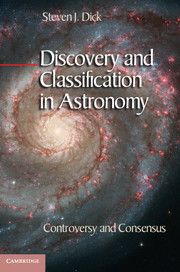Book contents
- Frontmatter
- Contents
- Preface
- Abbreviations
- Introduction The Natural History of the Heavens and the Natural History of Discovery
- Part I Entrée
- Part II Narratives of Discovery
- Part III Patterns of Discovery
- 6 The Structure of Discovery
- 7 The Varieties of Discovery
- 8 Discovery and Classification
- Part IV Drivers of Discovery
- Part V The Synthesis of Discovery
- Appendix 1 Astronomy’s Three Kingdoms
- Appendix 2 Astronomical Discoveries and Their Extended Structure
- Notes
- Select Bibliographical Essay
- Glossary of Concepts Related to Discovery
- Index
8 - Discovery and Classification
from Part III - Patterns of Discovery
Published online by Cambridge University Press: 05 August 2013
- Frontmatter
- Contents
- Preface
- Abbreviations
- Introduction The Natural History of the Heavens and the Natural History of Discovery
- Part I Entrée
- Part II Narratives of Discovery
- Part III Patterns of Discovery
- 6 The Structure of Discovery
- 7 The Varieties of Discovery
- 8 Discovery and Classification
- Part IV Drivers of Discovery
- Part V The Synthesis of Discovery
- Appendix 1 Astronomy’s Three Kingdoms
- Appendix 2 Astronomical Discoveries and Their Extended Structure
- Notes
- Select Bibliographical Essay
- Glossary of Concepts Related to Discovery
- Index
Summary
The first step in wisdom is to know the things themselves. This notion consists in having a true idea of the objects; objects are distinguished and known by classifying them methodologically and giving them appropriate names. Therefore, classification and name-giving will be the foundation of our science.
Linnaeus, 1735The initial classifier of any unknown subject necessarily begins with no idea of how to choose the key parameters. How then to produce a classification imbued with any fundamental physical significance or predictive power?
Allan Sandage, 2004The MK system [for stellar classification] has no authority whatever; it has never been adopted as an official system by the International Astronomical Union – or by any other astronomical organization. Its only authority lies in its usefulness; if it is not useful, it should be abandoned.
W. W. Morgan, 1979In contrast to the discovery of new laws, processes, or properties, one of the hallmarks of the discovery of localizable natural objects such as we have been discussing in this volume is an almost irresistible temptation to classify them. A new object will barely have been discovered before the human mind tries to determine where it “fits” in the order of things already known. This is undoubtedly an ancient instinct, and one of the basic characteristics of a developing and even a mature science, as basic to astronomy as it is to biology, geology, chemistry, and physics. To put it another way, the recognition of new classes and their classification is an integral part of natural history, and a particularly challenging activity when the discovery involves a new class of objects. The origin of the categories in which we think is a question rarely raised except in the rarefied reaches of philosophy, but it goes to the core of discovery. In discovery it may flare briefly and sporadically, as in the case of Pluto, or at more sustained length as in the case of stellar luminosity types. But once routine, the origin of the categories is often forgotten, even as they determine the way we think of things.
- Type
- Chapter
- Information
- Discovery and Classification in AstronomyControversy and Consensus, pp. 233 - 276Publisher: Cambridge University PressPrint publication year: 2013



